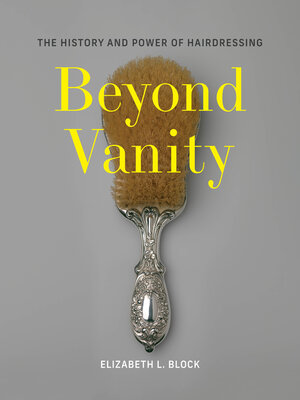
Sign up to save your library
With an OverDrive account, you can save your favorite libraries for at-a-glance information about availability. Find out more about OverDrive accounts.
Find this title in Libby, the library reading app by OverDrive.



Search for a digital library with this title
Title found at these libraries:
| Loading... |
From the award-winning author of Dressing Up, a riveting and diverse history of women’s hair that reestablishes the cultural power of hairdressing in nineteenth-century America.
In the nineteenth century, the complex cultural meaning of hair was not only significant, but it could also impact one’s place in society. After the Civil War, hairdressing was also a growing profession and the hair industry a mainstay of local, national, and international commerce. In Beyond Vanity, Elizabeth Block expands the nascent field of hair studies by restoring women’s hair as a cultural site of meaning in the early United States. With a special focus on the places and spaces in which the hair industry operated, Block argues that the importance of hair has been overlooked due to its ephemerality as well as its misguided association with frivolity and triviality. As Block clarifies, hairdressing was anything but frivolous.
Using methods of visual and material culture studies informed by concepts of cultural geography, Block identifies multiple substantive categories of place and space within which hair acted. These include the preparatory places of the bedroom, hair salon, and enslaved peoples’ quarters, as well as the presentation places of parties, fairs, stages, and workplaces. Here are also the untold stories of business owners, many of whom were women of color, and the creators of trendsetting styles like the pompadour and Gibson Girl bouffant. Block’s ground-breaking study examines how race and racism affected who participated in the presentation and business of hair, and according to which standards. The result of looking closely at the places and spaces of hair is a reconfiguration that allows a new understanding of the cultural power of hair in the period.
In the nineteenth century, the complex cultural meaning of hair was not only significant, but it could also impact one’s place in society. After the Civil War, hairdressing was also a growing profession and the hair industry a mainstay of local, national, and international commerce. In Beyond Vanity, Elizabeth Block expands the nascent field of hair studies by restoring women’s hair as a cultural site of meaning in the early United States. With a special focus on the places and spaces in which the hair industry operated, Block argues that the importance of hair has been overlooked due to its ephemerality as well as its misguided association with frivolity and triviality. As Block clarifies, hairdressing was anything but frivolous.
Using methods of visual and material culture studies informed by concepts of cultural geography, Block identifies multiple substantive categories of place and space within which hair acted. These include the preparatory places of the bedroom, hair salon, and enslaved peoples’ quarters, as well as the presentation places of parties, fairs, stages, and workplaces. Here are also the untold stories of business owners, many of whom were women of color, and the creators of trendsetting styles like the pompadour and Gibson Girl bouffant. Block’s ground-breaking study examines how race and racism affected who participated in the presentation and business of hair, and according to which standards. The result of looking closely at the places and spaces of hair is a reconfiguration that allows a new understanding of the cultural power of hair in the period.






